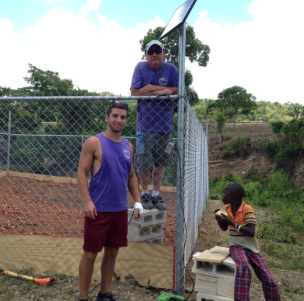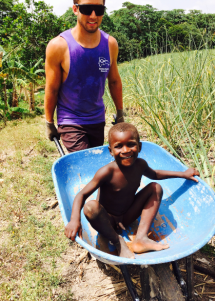The story below is about a ministry of the Dominican Republic Mission Team (DRMT), which is a recent recipient of the Matthew 25 Grant, sponsored by ABCUSA. The article below was written by Ryan O’Grady. Views expressed are the sole opinion of the author.
Americans may take for granted the simplest commodities offered in this country. Most people do not have to worry about drinking contaminated water, needing to grow their own produce or wondering where their next meal will come from. The people of Batey 50 do not have these simple luxuries and are living in complete poverty. However, all it takes is the smallest change to make the biggest impact.
The Dominican Republic Mission Team (DRMT) travelled once again this past June and July to Batey 50 hoping to make a positive change. This year the DRMT was awarded the Matthew 25 Grant from American Baptist Churches USA in order to build a sustainable garden within the sugar cane village. According to American Baptist Churches USA, the Matthew 25 Grant is, “designed to channel gifts to help meet the needs of housing, feeding, education and health with regard to the less fortunate.” After applying and being awarded a $2,500 grant, Matt Powers took the lead on this monumental project.
Powers spent months researching the necessary tools and equipment needed to create the garden. Before leaving for the DR, the equipment had already been shipped down and the project was ready to begin.
Powers decided to build the large container garden next to a river, which would act as a means of irrigation. He spent the first week with a few hired Dominican workers, who helped to measure and level the land, simply by using pickaxes.
During the second week, volunteers with the DRMT (which is a ministry of First Baptist Church of Wallingford, CT) helped Powers dig holes and pour cement, in order to keep the fence posts in tact. The group also installed chain link fencing and wood to keep the soil in place. During the third week, the second part of the group arrived and helped push wheel barrels of soil about 1/8 mile from the pile to the garden.
Once the 40 foot by 30 foot garden was intact and the soil was ready, the group began planting the produce. The garden is now growing green peppers, lettuce, tomatoes, onions, carrots, cilantro, oregano and tallota, a popular Spanish vegetable.
Aside from the garden, the grant money and dedication of the group helped create a solar pump system. Powers, a mechanical engineering major at Quinnipiac University, focused his energy on making sure this solar pump system would be portable in order to prevent it from theft by members of neighboring villages. To make the solar pump immune to theft, Powers installed a solar panel 15 feet high, and attached it to aluminum tubing and a cement base. The panel was then cemented into the home of the village health promoter, which is surrounded by a large fence.
To make the water pump system “portable,” Powers created a charging station inside the health promoter’s house. He did so by running electrical wires from the panel and connecting them to a regulator. This particular regulator receives the current from the solar panel, but only outputs a voltage of 12V. This is important because the charging system can only receive 12V, regardless of how strong the sun is at any given time. From that regulator, Powers ran electrical wiring to a deep-cycle marine battery so that a person can simply disconnect the charging wires and carry the entire toolbox (with pump and battery inside) to the garden when it needs to be watered.
Once the toolbox is at the garden, the filter at the end of the pump simply needs to be thrown into the river. On the other side of the pump is a 100-foot garden hose that is used to irrigate the garden. The pump receives power by clamping the electrical cables from the pump to the battery. The battery can power the pump for 2-3 hours at a time. When the watering for the day has concluded, the pump/battery toolbox is carried back to the health promoter’s house and reconnected to the solar panel to be recharged.
To ensure the maintenance and longevity of the garden, Powers hired a resident of Batey 50 to take care of the garden. The gardener will water the garden thoroughly at least once a day and harvest the plants. The gardener will also deliver the fully-grown vegetables to the leaders of the local church, who will distribute the harvest to the people of the village.
“My parents who lead these trips, my church, the mission team, and I are extremely thankful for the Matthew 25 Grant that we received. This project was an idea that I was inspired to pursue, but I would never have been able to attempt it at all had it not been for the ABCUSA grant,” Powers said. “That $2,500 grant is really going to have an exponential effect on Batey 50, which now has about 1,000 square feet of fresh vegetables growing in their village. I believe the villagers’ quality of life will truly improve from this project.”
For more information about the DR Mission Team, please visit http://drmissionteam.org/.
The Matthew 25 Grant, sponsored by ABCUSA, is funded by a generous donor whose goal is to help meet the needs of “housing, feeding, education and health with regard to the less fortunate.” Ministries must be in relationship with American Baptist Churches to be eligible to apply. Awards for the Matthew 25 grant are made twice a year, in April and October, with application deadlines of March 1 and September 1. To view the guidelines and download the application form, click here.




